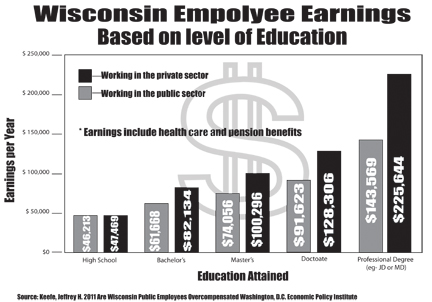Support union workers in Wisconsin

By Catherine Lee
The Guardsman
Wisconsin public-sector workers and their supporters have been demonstrating at the state capital to defend the existing union standards of collective bargaining for more than two weeks.
Gov. Scott Walker proposed a budget which is contingent on the removal of many collective bargaining rights, and he has refused to negotiate with the workers, even though they have already agreed to compensation cuts.
Walker’s demand for the elimination of most collective bargaining to avert a financial disaster is a political maneuver unsubstantiated by the reality of the state’s budget. Eliminating union power is his real goal.
To avoid voting on this unacceptable budget, the Wisconsin Senate democrats left the state. Worker support demonstrations in Madison have exceeded 70,000 people.
The Wisconsin workers are not the cause of the budget deficit. They have already agreed to wage and pension cuts to help bridge the state’s shortfall, and they must keep their rights to organize and to collective bargaining.
The state’s budget woes are driven by a combination of the U.S. financial collapse, related value losses in pension funds and a tax cut passed in early 2011.
Walker’s politics, not the state’s public employees, are responsible for the deficit. The New York Times reported that Walker and the state legislature gave away $117 million in tax breaks early this year, which account for a large portion of Wisconsin’s $137 million shortfall.
Collective Bargaining
Good working conditions and living wages are a mandatory feature of many American workplaces, but maybe we take them for granted. Negotiated work rules protect everyone.
Collective bargaining allows workers to pool their power. While one worker may simply be fired for demanding health-care benefits or a living wage, a union representing the whole work force has more clout.
In a Feb. 28 New York Times/CBS News poll that asked U.S. residents if they favored stripping workers of collective bargaining rights, 60 percent of respondents were opposed and only 33 percent were in favor of “taking away some of the collective bargaining rights.”
Worker Scapegoats
“The average government worker in America earns a lot more than the average private sector person,” Indiana Gov. Mitch Daniels told PBS.
But Paul Krugman, the Economics Nobel Prize winning columnist for the New York Times clearly states in his Feb. 25 blog post, “Yes, some public-sector workers are overpaid.”
“But the whole idea that union excesses are at the core of state and local fiscal problems is false, and only deliberate obfuscation keeps that from being obvious,” he wrote.
Compensation Facts
Ethan Pollack at the The Economic Policy Institute specifically wrote about Wisconsin compensation to address the claim that pension benefits boost compensation beyond private-sector compensation.
His analysis compared total compensation — health care, vacations, pensions and wages — for public versus private sector workers.
“Workers with a bachelor’s degree or more — which constitute nearly 60 percent of the state and local workforce in Wisconsin — are compensated between $20,000 less to over $82,000 a year less,” Pollack wrote.
A recent New York Times study of census data cited an “educational divide” between public and private employees.
Pollack unequivocally states that Wisconsin public sector workers make less than private sector workers. The numbers have been crunched and the facts support the Wisconsin workers.
Email:
clee@theguardsman.com
